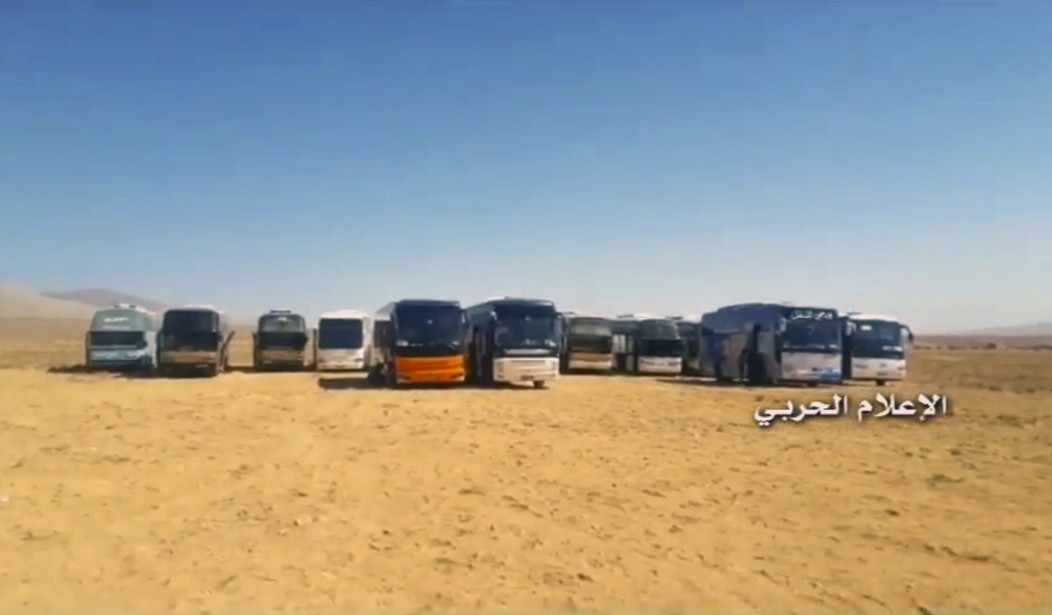ARLINGTON, Va. — The U.S. military has not stopped food and water delivered from Syrian regime territory from reaching a convoy of tour buses carrying ISIS terrorists and family members, the spokesman for U.S. operations in Iraq and Syria said today.
The buses carrying ISIS fighters from the Lebanon-Syria border to the Iraqi border in Syria have not come under fire from coalition forces; some in the convoy have broken off and retreated to Syrian regime territory, while 11 buses are still looking for a place to unload.
Bashar al-Assad’s regime and Hezbollah forged a deal with the Islamic State under which more than 300 ISIS terrorists, accompanied by family members, received safe passage to Deir ez-Zor province southeast of Raqqa. The final destination was Al-Bukamal — a mere 13-minute drive from the Iraq border crossing. The deal angered Iraqi Prime Minister Haider al-Abadi.
In return for their bus rides, ISIS pointed to the burial location of several Lebanese soldiers kidnapped by the terror group in 2014.
“We continue to monitor the 11 buses that remain in the open desert, fully aware of ISIS families and noncombatants that are also present. We have not struck the convoy itself and have not hindered food and water resupplies to reach the convoy,” Col Ryan Dillon, spokesman for Operation Inherent Resolve, told reporters from Baghdad.
No ISIS fighters have escaped from those 11 buses, he said, despite reports to the contrary. “We have struck individual ISIS fighters and fighters that leave in small groups to walk away, and as soon as they get far enough away from the buses — we have, and we will continue to strike ISIS fighters that venture far enough away where we can hit them without causing harm to the civilians that are a part of that convoy,” he said.
Dillon said the fleet of 17 buses separated a week ago; six doubled back “and went further into Syria towards Palmyra” — “we just made a decision to stop monitoring it as they, you know, drew further into the interior of Syria” — while the 11 currently under U.S. surveillance are “in the desert.” He could not say how many ISIS fighters were on the buses.
“I don’t know if the first three buses had all ISIS fighters and then the following — the rest of the buses had just family members. I don’t have that break-up. I don’t know — I didn’t have a headcount for each of the ISIS buses,” he said. “And so, what we can do is get an estimate to find out how many are in the 11 in the north, and then how many are the south. But, you know, I would say that it was a mix in both the six buses in the south, and a mix in the 11 buses that are still remaining in the north.”
“We know that there are family members that are still remaining in those 11 buses, because we’re watching these buses the whole time. And as far as we know where [aid] is coming from, I can’t say, you know, with 100 percent if it’s coming from the regime armed forces. But it is coming — that food and aid is coming from Syrian-held territory. And if we can assess, you know, that — that it is not ISIS fighters, then we are — again, we are not helping with the delivery of this aid, but we are not going to hinder it, either.”
Dillon emphasized again that the U.S. was “not party to this agreement, and the deal to transport hundreds of experienced ISIS terrorists across Syrian-held territory to be delivered to the border of Iraq, of which — Iraq, you know, did not say in this agreement, either — is unacceptable to us,” and after finding out that the convoy was on the move “we repositioned assets and we stopped and prevented this convoy from linking up with fellow ISIS fighters.”
“Our mission is clear, and that is to defeat ISIS. It is not to push ISIS around and leave them for someone else to have to deal with,” he said. “So I think that — I know that while we did not expect an event like this, it has been lucrative, and it has allowed us to take several ISIS fighters, leaders and resources off the battlefield.”









Join the conversation as a VIP Member